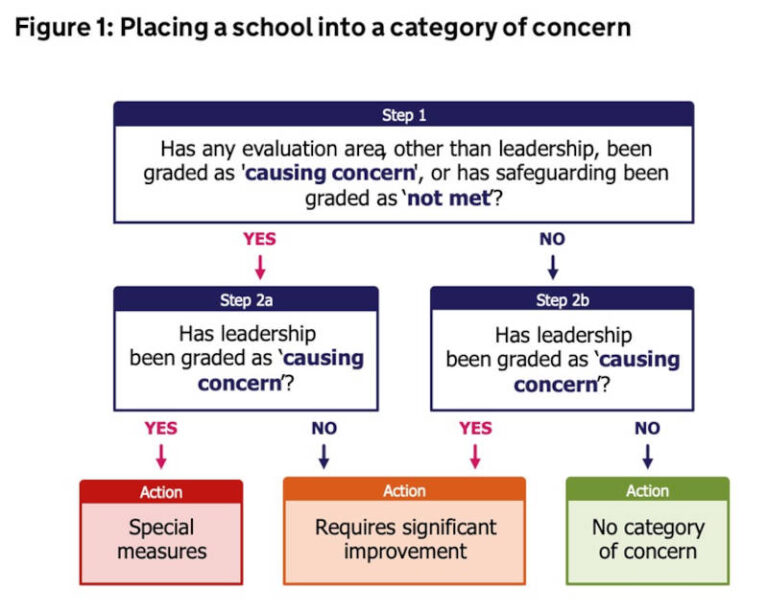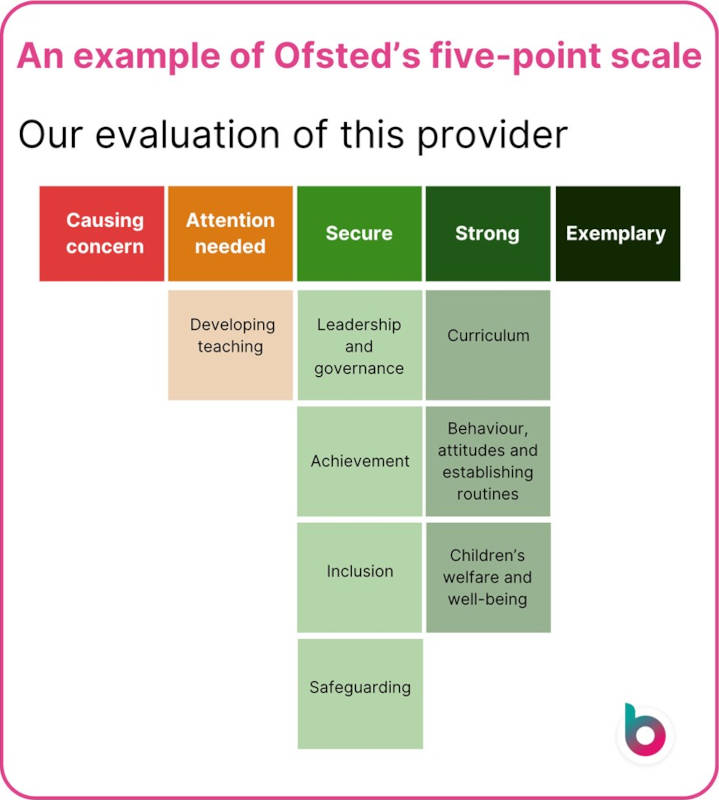Ofsted is changing the way it reports on schools and maintained EYFS settings. On the 4th of September 2024, Ofsted announced the removal of single-word judgements for school inspections.
The recent Ofsted changes impact those early years settings attached to maintained primary schools or academies. The wider EYFS sector has yet to be affected by the recent changes.
On the 16th of September, 2024, Ofsted released its latest School Inspection Handbook, a framework all Ofsted inspectors will follow when visiting a school or maintained nursery school.
And if that wasn’t enough new documentation to familiarise yourself with, on the 3rd of February, 2025, Ofsted released their consultation on how they will inspect schools and nurseries. This consultation will run for 12 weeks (ending on the 28th of April). We then expect the decided changes to be applied to schools (and nurseries) soon afterwards.
We share a summary of the changes in the new Ofsted School Inspection Handbook.

Ofsted inspections resume
Routine Ofsted inspections returned on the 23rd of September, 2024. The recent Ofsted changes to remove the use of single-word overall judgements will apply to maintained primary schools, nursery schools, and academies.
If inspected, private nurseries and childminders will still have an overall judgement. The suggested plan is to expand the removal of the overall single-word judgement to EYFS settings and independent schools this year (2025).
State-funded schools and nurseries will instead receive an Ofsted Report Card – this will detail the inspector’s findings on a 5-point colour-coded scale. Instead of the historically used single-word judgements: outstanding, good, requires improvement, inadequate they have favoured the 5-point scale shown below.

The new changes set out in the Inspection Handbook mention EYFS provision as any provision provided to children in the early years range before or after school and also during holidays.
Nurseries and EYFS settings will still be inspected using the Early Years Inspection Handbook – although we are expecting a new Early Years Inspection Framework to be released this year.
Ofsted Grading by in the key areas
As mentioned on the 4th of September, 2024, there will no longer be a single-word judgement given to the overall inspection.
The current areas of Ofsted evaluation for nurseries are:
- Quality of Education
- Behaviour and Attitudes
- Personal Development
- Leadership and Management
Under the proposed changes (February , 2025) the new evaluation areas are:
- Leadership and governance
- Curriculum
- Developing teaching
- Achievement
- Behaviour, attitudes and establishing routines
- (For schools, this is just Behaviours and Attitudes)
- Children’s welfare and well-being
- (For schools, Personal Development and well-being)
- Inclusion
- Safeguarding
Schools also have:
- Early years in schools (where applicable)
- Sixth form in school (where applicable)
Reminder: The provision for early years includes before- and after-school and holiday clubs.
If a school has an early years provision, this will also have a judgement made on it.
If one or more of the key areas is judged ‘attention needed,’ Ofsted will monitor the school, much like in the previous system. This is the current suggestive process for identifying a nursery that is ‘causing concern’.

Here’s the latest information about reinspection if a school or nursery is causing concern:
"For schools that require significant improvement (previously serious weaknesses), we would complete 5 monitoring inspections within 18 months, unless the issues have been resolved earlier.
"If after 5 monitoring inspections, the school is still causing concern, we would conduct a full reinspection. For schools that require special measures, we would complete 6 monitoring inspections within 24 months unless the issues have been resolved earlier.
"If after 6 monitoring inspections, the school is still causing concern, we would conduct a full reinspection."
Ofsted consultation documentation, February 2025.
The noticeable change for schools under a formal category of concern is the procedure with leadership.
Previously, the headteacher in post would be changed as rapid improvement was needed. However, external support from schools selected will now offer the needed improvement without changing leadership.
Further information on how the government plans to support stuck state-funded schools or nurseries has been released. This won’t impact private day nurseries or other EYFS settings that aren’t state-funded – but handy to know!
September 2024 changes to the Early Years Inspection Handbook
The September 2024 changes have seen five minor alterations have been made to the Early Years Inspection Handbook.
- Clarification on funded places and what should be considered during an inspection.
- Wording has changed in relation to the ongoing impact of Covid in settings (paragraphs 50, 174, 203). There has been an addition of the phrase ‘If relevant’ as it is not deemed current any longer.
- Wording has been altered in paragraphs 78, 130, 217 and 247 to align with the changes to parts 2 and 3 of the Ofsted Inspection Handbook. This includes where minor improvements are identified during the inspection and can be put right before the end of the visit.
- When describing what ‘good’ looks like in the Quality of Education key area, bullet point 3 has changed to discuss an ambitious curriculum for all children (now including disadvantaged children and those with SEND).
- When describing what inadequate looks like in the Quality of Education key area, bullet point 4 has changed when describing disadvantaged children (they have added ‘particularly disadvantaged children who receive additional funding, including EYPP).
We’re expecting the release of a new early years inspection framework following the big changes made by Ofsted in the last 12 months. We’ll update you as soon as it drops.

The pre-inspection phone call
Notifications for an Ofsted inspection will be via a phone call to the headteacher from 9:30 am on the Monday of the week of the inspection.
There are a few exceptions to this routine. If there is a bank holiday on the Monday of the inspection week, the pre-inspection phone call will be made on the Tuesday. Or, if the initial inspection was delayed, the rearranged pre-inspection phone call may not follow the same Monday from 9:30 a.m. routine.
Urgent Ofsted inspections only give a 15-minute warning for a visit and do not follow the Monday morning or pre-inspection phone call process.
Paragraph 112 of the Inspection Handbook highlights the information schools must provide before 8 a.m. on the inspection day.
The headteacher is expected to take the pre-inspection phone call from the Ofsted inspector. However, they are encouraged to have another senior staff member present during the phone call (this can be a member of the SLT, governors, or board of trustees).
Reminder: If the headteacher is unavailable for the phone call, they will ask to speak to the most senior school staff member available.
Confidence about what to do before, during and after your Ofsted inspection will help reduce panic and ensure you present the best picture of your school.
The new rules on Ofsted logo use
Many schools and nurseries use their good or outstanding Ofsted ratings as a marketing strategy to attract prospective parents. Schools and nurseries must now consider alternative methods of positive marketing with the recent Ofsted changes.
Any school or nursery judged ‘good’ or ‘outstanding’ for overall effectiveness before September 2024 can still use the Ofsted logo on its promotional materials.
Schools and maintained nurseries inspected after September 2024 cannot use the Ofsted judgement logos as they relate to the overall effectiveness judgement (the single-word judgement that has been abolished).
There are terms of use for the Ofsted logo that is useful to look through especially if you would like to celebrate an area of the inspection that has been judged outstanding.
As the new format will be the report cards, the new layout will likely look something like this:

The types of Ofsted inspections
You will have heard of graded, ungraded and urgent Ofsted inspections. For total clarity, here are the definitions of the types of Ofsted inspections:
What is a graded Ofsted inspection?
A graded inspection used to be known as a Section 5 inspection (because section 5 of the Education Act 2005 governs it).
Graded Ofsted inspections use the full framework to evaluate the school’s effectiveness in the four key areas (Quality of Education, Behaviour and Attitudes, Personal Development and Leadership and Management).
Previously, the school would receive an overall ‘best-fit’ judgement, but this is no longer the process.
The current government aim to bring in an Ofsted School Report Scorecard in the next 12 months, this was detailed in Labour’s plans for education and childcare.
What is an ungraded Ofsted inspection?
An ungraded Ofsted inspection was previously known as a Section 8 inspection. They aim to evaluate the school’s progress since the last inspection.
The inspectors are looking to see if the school or nursery has taken ‘effective action’ to maintain their previous good or outstanding judgement.
Many schools and maintained nurseries that have received a good or outstanding judgment before September 2024 will have an ungraded inspection.
Very occasionally, an inspector may deem an ungraded inspection to be increased to a graded inspection and will use the usual grading system (outstanding-inadequate) to judge each of the four key areas.
There will be no ungraded inspections anymore. Ofsted wants clarity for settings on when their next inspection will take place and to ensure no settings slip through the net when it comes to child and learner outcomes and progress.
Reminder: There will be no deep dives of subjects in an Ofsted inspection.
What causes an urgent Ofsted inspection?
A school or nursery does not have to be classed in a category of concern to receive an urgent Ofsted inspection.
Ofsted will immediately inspect any school or nursery setting if concerns have been brought to its attention that impact pupils or staff’s safety, well-being, or educational standards.
Regional Directors for Ofsted decide if a setting should have an urgent inspection. They base this decision on the information they have available and via a risk assessment, taking into consideration any new information they have via complaints.
Ofsted will not investigate individual complaints about a school: instead, they will focus on the whole-school issues that may have led to this complaint or incident.
Inspectors will contact the school or nursery 15 minutes before they arrive on-site for an urgent inspection.

'Suspend and return' Ofsted policy
There has always been the option to defer Ofsted inspections in extreme circumstances. The most recent guidance on suspending an inspection aligns with the changes linking to safeguarding concerns found during an inspection.
The latest Ofsted changes note that state-funded school inspections can be suspended once they have begun in extreme circumstances or to allow schools to resolve safeguarding issues highlighted in the inspection.
If the school is allowed to resolve safeguarding concerns during a suspension of visits, another visit will take place after the changes are made to complete the inspection.
Reminder: Looking after leaders' well-being during Ofsted inspections is encouraged. Inspectors are encouraged to respond sensitively to leaders’ emotions and feelings of distress. Taking a break from inspection activities is appropriate if that is beneficial.
Useful Inspection Handbook things to remember
The School Inspection Handbook is a detailed document. When we re-read it for this article, we found several useful reminders that we wanted to share with you.
Hiring ECTs as a category of concern school or nursery
After an Ofsted visit, the report will usually guide if Early Career Teachers (ECTs) are suitable hires to consider due to the quality of support they will receive from the school.
If the school or nursery is in a category of concern, the Ofsted inspector may deem it unsuitable for ECTs to learn good practice right now. It may be recommended that no ECTs be hired until the next inspection.
The same guidance is given to academies, although this can’t be enforced, so it remains as guidance.
When will I next have an Ofsted inspection?
More details about Ofsted’s visit window will be released in September 2025 for schools inspected post-September 2024.
The Department for Education has set a rough timeline for expected Ofsted visitation windows in paragraphs 44-47 of the handbook.
Leaders’ wellbeing and mental health with Ofsted inspections
Following the tragic death of Ruth Perry in January 2023, there has been a shift towards leaders’ mental health and the recognition of the toll an Ofsted inspection can have on the staff of a school or nursery.
The handbook mentions several occasions when inspectors will note who is responsible for checking the headteacher’s mental health and well-being (be that the local authority, governors, or board of trustees).
Ofsted inspections are designed to ensure the educational systems in England meet a consistently high standard across the country. It is important to always remember your school or EYFS setting’s primary driver is to offer excellent educational provision that meets the needs of your pupils and their families.
A note from Blossom...
We are proud to work with so many fantastic early years settings, from maintained nurseries to private daycare nurseries. The dedication, knowledge and hard work we see every day with our customers highlight the abundance of skills the early years sector has at its fingertips.